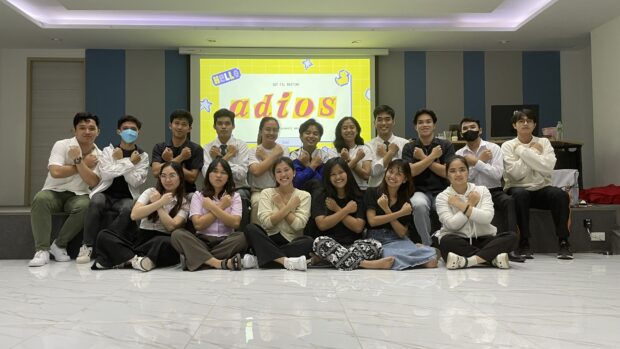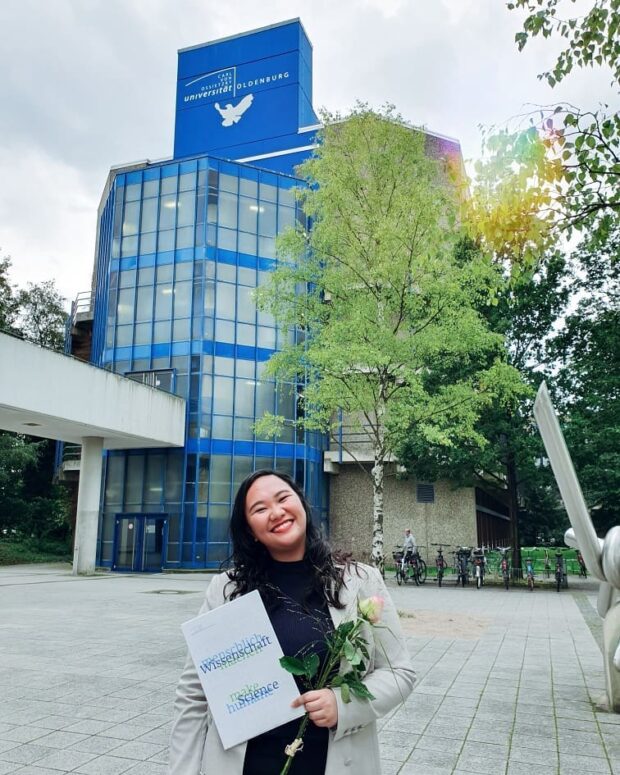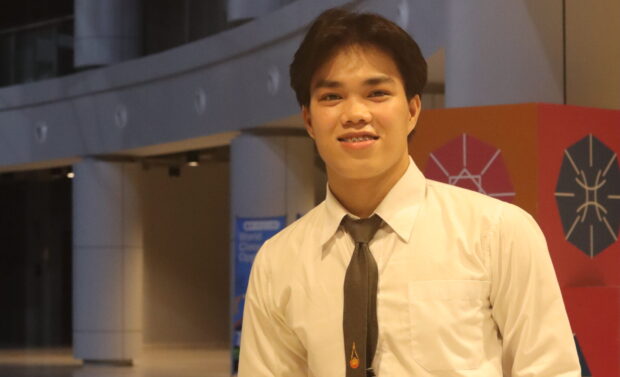Despite the challenges, migration opens up opportunities

Angelo Virgo with Filipino scholars at Suranaree University of Technology. (Photo from Angelo Virgo)
Angelo Virgo, a 21-year-old from Valencia, Bukidnon, arrived in Thailand on January 20, 2021, right after graduating from senior high school.
Despite the COVID-19 situation, it did not deter him from leaving the Philippines. It was also his first time traveling abroad.
Unlike the majority of Filipinos in Thailand seeking employment, Angelo and the six others from the Philippines received a scholarship grant to study at Suranaree University of Technology (SUT) in Nakhon Ratchasima. They were the first batch of Filipino undergraduate students to study various technology and engineering courses under the Royal Scholarship of Princess Maha Chakri Sirindhorn. The scholarship is given every year to nationalities from the Asean except Thailand. Angelo’s batch is set to graduate in December 2024. Presently, there are 18 Filipino scholars at SUT.
Angelo is determined to find work in Thailand or pursue a master’s degree rather than go back home.
“I can apply my English and Thai language skills here and I can work with people of different nationalities. I think the quality of life would be better here than in the Philippines,” Angelo says.
Migrant Filipinos in Thailand
Angelo is among the estimated 18,000 Filipino migrants in Thailand who are either studying or working various jobs mainly as teachers, engineers, development workers, and nannies.
In a 2017 report by the Department of Employment of Thailand, 14,830 Filipinos currently work in Thailand taking jobs in teaching, management, engineering, architecture, hospitality, and business. There is no available data yet as of 2022.
Despite official figures, the Philippine Embassy estimates that the total Filipino population in Thailand stands at 17,921, suggesting that approximately 4,000 may be engaged in non-registered or irregular sectors, while the remainder comprises students, spouses, children of migrants, and those employed in recognized fields.
From 2020 until the middle of 2021, hundreds of Filipinos were repatriated due to a lack of work resulting from the pandemic. However, when the Kingdom started relaxing its travel guidelines, thousands of Filipinos, tourists, and those looking for work started coming in.
Recently, over 200 Filipino human trafficking victims also passed through Thailand on their way to work in scam dens in Myanmar and Cambodia.
Migration is a “norm”
Labor migration is considered a ‘norm’ and an expectation especially in the context of the Philippines, according to Justine Grace Abrugena, Programme Coordinator of European Master in Migration and Intercultural Relations (EMMIR) at the University of Oldenburg. EMMIR is an Erasmus Mundus Join Master (EMJM) programme funded by the European Union under Erasmus+.
According to the Philippine Statistics Office in October, it is estimated that there were 1. 96 million Overseas Filipino Workers (OFW) who worked abroad from April to September 2022. In the same report, Filipinos who worked abroad without working visa or work permits such as students, and other types of non-immigrant visas was estimated at 26 thousand.
Countries in Asia (80.8%) become the top destinations of OFWs, followed by Europe (9.0%), North and South America (6.3%), Australia (2.9%), and Africa (1.0%). Yet, of 1.96 million OFWs, about 23.0 percent worked in Saudi Arabia, followed by UAE at 13.7 percent. Other countries in Asia with large numbers of OFWs include Kuwait (7.7%), Hong Kong (6.1%), Qatar (5.8%), and Singapore (5.0%).
Abrugena says that the Philippines highly commends and encourages its people to leave its borders for economic purposes. She grew up hearing migration narratives of both international border crossings and internal or local migration from family members.
Abrugena was a migration scholar of EMMIR before working in Germany in 2019 after her graduation.
Politics and economics of migration
Joel Mark Barredo, the Executive Director of the Strengthening Human Rights and Peace Research and Education in Asean/Southeast Asia program (SHAPE-SEA) at Mahidol University explains that migration is also a political issue because it dictates policies on economy and labor.
Furthermore, migrants not only carry leverage over the economic status of their family and community but also political influence, particularly on how governments are formed or voted for.
In 2022, the total remittance of OFWs had reached P197 billion (USD 3.5 billion). This included cash sent (P145.40 billion), cash brought home (P43.90 billion), and in-kind (P8.17 billion). Out of the P145.40 billion, P103.45 billion (USD 1.85 billion) were from Asian countries.
Misconception
However, there is a prevalent misconception in the Philippines that migration always leads to financial prosperity. Contrary to this belief, migration, whether for education or work, requires substantial financial resources, often seen as an investment. Many Filipinos take out loans or resort to extreme measures for migration, yet the immediate return on investment (ROI) is not guaranteed, Abrugena explains.
Due to this misconception, migrants often fall prey to scams.
Colonel Dominador Matalang of the Philippine Embassy’s Office of Police Attache (OPA) in Thailand, says that migrants may experience financial difficulties as they adapt to a new country and work to support themselves and their families back home. Scammers may prey on their financial stress by offering false promises of quick, easy money. Some of these are Ponzi schemes where a person needs to recruit “investors” to be able to earn double or triple investments.
To prevent scams, Colonel Matalang says that it needs a multi-faceted approach where the host countries, employers, and the Philippine Embassy can provide legal assistance, establishing communication channels for migrants, community support, financial literacy, and awareness campaigns.
As an international student, Angelo does not worry about his expenses.
“If I studied in the Philippines, the financial struggle would probably be more challenging, and my mental health might be compromised. Thanks to the Royal Scholarship, I no longer need to worry about accommodation and tuition,” Angelo says.

Justine Abrugena at Universitat Oldenburg, a migrant scholar who is currently the Programme Coordinator of EMMIR. (Photo credit: Justine Abrugena)
Migration as an opportunity
Amidst the challenges of loneliness and anxiety, and for some, incidence of physical and psychological violence from their employers or the locals of the host countries, migrant workers remain.
Migrants stay due to several reasons, aside from familial obligations and responsibilities.
“Migration opens us to new opportunities which are not available in our home country. For example, efficient services; no or less traffic, social services, and healthcare,” Abrugena explains.
Despite the backdrop of the Philippines’ labor export policy, Filipinos are recognized for their unwavering work ethic, as emphasized by Barredo. “We take pride in our hard-working nature,” he adds.
Living independently in Thailand and working with international students from different cultural backgrounds changed his perspective.
“I’ve learned how Filipinos can be globally competitive, and we can offer so many things to the world. I am excited to know more about the world – the world outside the Philippines,” Angelo ends.
